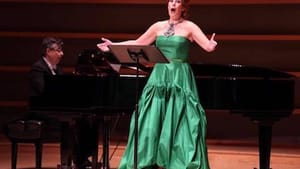Stay in the Loop
BSR publishes on a weekly schedule, with an email newsletter every Wednesday and Thursday morning. There’s no paywall, and subscribing is always free.
The diva next door
Opera Philadelphia's O17 Festival presents Sondra Radvanovsky in recital

Sondra Radvanovsky tells of being introduced to the great Leontyne Price by James Levine. “Leontyne, this is Sondra,” the maestro said. “She’s the new you.”
The senior soprano didn’t miss a beat: “Girl, you’re the new you!”
Unstuffing the recital
That pronouncement seems especially true in light of Radvanovsky’s Sunday afternoon recital at the Kimmel Center’s Perelman Theater, presented as part of Opera Philadelphia’s O17 Festival. The Illinois-bred, Toronto-based soprano possesses a supple and easily produced spinto soprano that lends itself to a variety of musical styles. But perhaps even more notable are her unforced humor and generosity of spirit.
Recitals can be stuffy affairs. Are we supposed to believe the singer showed up at 2pm in a floor-length ball gown and a necklace Queen Elizabeth I might have worn? And what’s with the custom of leaving the stage after every number, only to return moments later? This level of archness reinforces the idea that classical music must be endured, not enjoyed.
Happily, Radvanovsky quickly dismissed any suggestion of priggishness. Acknowledging the music stand that stood front and center throughout the program, she wanted us to know that her rehearsal time for this engagement was slightly abbreviated. She’s been simultaneously preparing to sing a little operatic role (Bellini’s Norma) at an obscure theater (the Met) for an insignificant occasion (opening night, next Monday). So, she might be a little frazzled. But she rarely let that show.
Across the continent
Radvanovsky’s program was wide-ranging, encompassing four languages (English, French, German, and Italian), three genres (aria, art song, and musical theater), and two centuries. Some selections worked better than others. The soprano’s strong proficiency for Italian showed most keenly in her opening, Vivaldi’s “Sposa son disprezzata” (“I am the wife who is scorned”).
She crisply enunciated every consonant and spun a flawless vocal line, cleaving her voice to Antony Manoli’s supportive piano accompaniment. Ever the committed actress, Radvanovsky infused the brief text — which tells of a wife still faithful to her philandering husband — with equal parts refulgent passion and deep sorrow.
A series of art songs by Richard Strauss provided the afternoon’s most surprisingly satisfying moment. Radvanovsky feigned exasperation with the German language in a brief introduction, but to this speaker’s ear, her phrasing sounded fine. Perhaps a bit more rehearsal would have allowed her to make more of the words across the four selected songs, but by the time she hit her stride with the famous “Morgen” (“Tomorrow”), I was fully won over by the richness of her tone.
With only a few bumps along the way
Not everything came across perfectly. Radvanovsky’s French turned mushy in a series of songs by Liszt; her elocution was surprisingly worse in Samuel Barber’s “Hermit Songs,” which Madame Price herself debuted in 1953. And although Radvanovsky met Bellini’s treacherously long vocal lines head-on in a series of concert arias, her voice occasionally gave out before certain phrases came to an end.
The soprano truly hit her stride in the program’s final listed selection: “La mamma morta” (“My mother is dead”), from Umberto Giordano’s Andrea Chenier. Radvanovsky steadily escalated the dramatic tension throughout the six-minute aria, building to catharsis in its climactic cries of “Io son l’amore, io son l’amor” (“I am love”).
Passion and playfulness characterized her encores, which began with a haunting “Song to the Moon” from Antonín Dvořák’s Rusalka, followed by “I Could Have Danced All Night.” The afternoon closed with “Vissi d’arte” (“I lived for art”), from Giacomo Puccini’s Tosca. Tosca has become one of Radvanovsky’s hallmark roles, and her vibrant performance of the heroine’s signature aria virtually transported the audience to the Castel Sant’Angelo. You have no doubt Radvanovsky lives for, and in, her art.
Radvanovsky mentioned that the recital was her first time singing in Philadelphia, but it wouldn’t be her last. Praise be.
What, When, Where
Sondra Radvanovsky in recital. Anthony Manoli, piano. Various selections. Opera Philadelphia. September 17, 2017, at the Kimmel Center’s Perelman Theater, 300 S. Broad Street, Philadelphia. (215) 732-8400 or operaphila.org.
Sign up for our newsletter
All of the week's new articles, all in one place. Sign up for the free weekly BSR newsletters, and don't miss a conversation.

 Cameron Kelsall
Cameron Kelsall